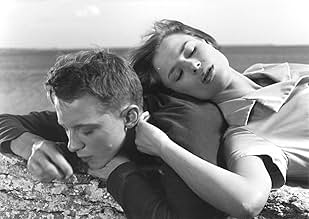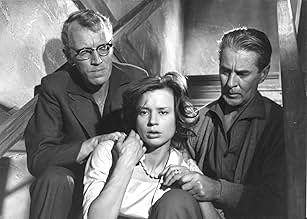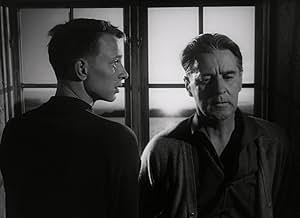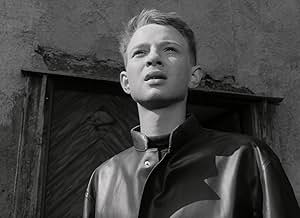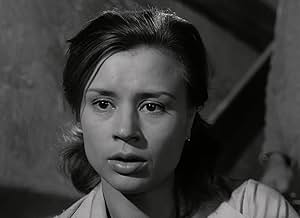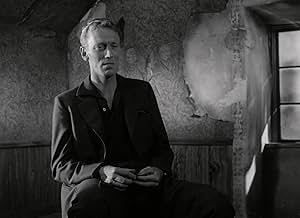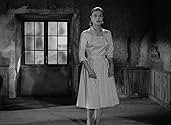Sortie récemment d'un hôpital psychiatrique, Karin retrouve sa famille affectivement déconnectée et leur maison sur une île, uniquement pour perdre pied avec la réalité en commençant à croir... Tout lireSortie récemment d'un hôpital psychiatrique, Karin retrouve sa famille affectivement déconnectée et leur maison sur une île, uniquement pour perdre pied avec la réalité en commençant à croire que Dieu se manifeste à elle.Sortie récemment d'un hôpital psychiatrique, Karin retrouve sa famille affectivement déconnectée et leur maison sur une île, uniquement pour perdre pied avec la réalité en commençant à croire que Dieu se manifeste à elle.
- A remporté 1 oscar
- 3 victoires et 5 nominations au total
Histoire
Le saviez-vous
- AnecdotesThe first Ingmar Bergman film to be made on the island of Fårö. Bergman would later buy a home on the island.
- GaffesAs Minus paints the chair, the amount of paint on the chair changes between shots.
- Citations
Fredrik: Father, I'm scared. When I was hugging Karin in the boat, reality was revealed. Do you know what I mean?
David: I do.
Fredrik: Reality was revealed, and I collapsed. It's like a dream. Anything can happen. Anything.
David: I know.
Fredrik: I can't live in this new world.
David: Yes, you can. But you must have a support.
Fredrik: What kind of support? You mean a God? Give me a proof of his existance. You can't.
David: I can. But you gotta pay attention to what I say.
Fredrik: Yes. I need to listen.
David: I can only tell you a thought of my own hopes. It is to know that love exists for real in the human world.
Fredrik: A sort of special love, I suppose?
David: All kinds of it. The bigger and the smaller, the most absurd one and the most sublime one. All kinds of love.
Fredrik: What about the desire for love?
David: Desire and denying. Trust and distrust.
Fredrik: Then love is the proof?
David: I don't know if love is the proof of God's existance or if it's God itself.
Fredrik: To you, love and God are the same thing.
David: That thought makes me feel less empty; Makes my desperation less worse.
Fredrik: Go on, dad.
David: All of a sudden, emptiness turns into abundance, and desperation turns into life. It's like a temporary death's sentence strike.
Fredrik: Dad... if it's like how you say it is, then God is all over Karin. We love her so much.
David: Yes.
Fredrik: Can't that help her?
David: I think so.
- Générique farfeluThere are no end credits. After Minus (Lars Passgård) says the final line, the film fades to black and ends. The entire cast and crew were credited at the start, and there isn't even a "Fin" or "Ende".
- ConnexionsFeatured in Reel Radicals: The Sixties Revolution in Film (2002)
- Bandes originalesSarabande from Suite No. 2 in D minor for Violoncello
Written by Johann Sebastian Bach
Performed by Blondal Bengston.
The film is a major work of cinema and a major work of Bergman. If one looks at the body of Bergman's films he was probably approaching his peak of artistry, which he would achieve in his next work "Winter light", a film that Bergman himself called perfect. The reason most viewers do not grasp the importance of the magnificent "Man-God trilogy" or "the Silence trilogy" or "the Dark/Faith trilogy" (three films: "Through a glass darkly", "Winter light", and "the Silence") is that the trilogy deals with the theological question of God's existence. It is essentially a thinking person's film. If you can reflect on what you see, these three films are a treasurea treasure that influenced major directors several decades later, specifically Kieslowski who made "Three Colors: Blue" also almost entirely based on 1 Corinthians Chapter 13, Tarkovsky who seems to have borrowed some ideas like the sudden baptismal rain from this film that he employs in "Solyaris" and "Stalker" and finally the exciting new talent from Russia Andrei Zvyagintsev (director of "The Return", also taking a leaf from the Bergmanesque sonfather relationship). All these films seem to have been influenced by this seminal work of Bergman.
To those viewers, who are not spiritually inclined, the film could be reduced to the obvious action of Harriet Anderson's character Karin insisting on wearing goggles as she steps out of her home to live the rest of her life in a hospital. It could easily be interpreted as a study of mental illness, a film that gives credence to the theory that god does not exist. The film can equally be interpreted as a film on mad people who feel they are in communion with god, who at other times are slaves to dark forces (voices).
On the other hand one can argue the intensity of the light is a metaphor for a sign that God existsthe basic question that troubled Bergman, the son of a priest, in real life. Even the young Minus kneels down to pray to God as the rain (baptismal?) falls suddenly. A keen viewer will note that there is no sign of rain on island or of rain drenching men in an open boat soon after the event. Only Karin's hair is wet. All three films seek an answer that God exists from a silent, "inscrutable" (to quote a word from this film) God to whom millions pray. "Through a glass darkly" opens with a shot of the almost still, dark waters of the sea mirroring the sky. The film ends with several references of light. For the cynical, Bergman was disillusioned and felt that God was a "spider" (the intriguing image for the DVD covers of the three films), a reference to Karin's outburst towards the end of the film. If Bergman, was truly disillusioned, would he have added the final epilogue where the father tells his son "God exists in love, in every sort of love, maybe God is love." These last words make the son say my father has "talked to me" the penultimate words of the filma seemingly spiritual response even Jesus on the cross wanted ("Father, father, why hast thou forgotten me?") before he died.
It would be ridiculous to see this work merely as a film seeking answers to God's existence. Like "Three colors: Blue", this is a film on love. There is the undiluted love of an atheist husband (shades of Bergman?) for his ailing wife (note the film is dedicated to Kabi, Bergman's wife at a point when divorce was looming large). There is love of a father for his daughter, son and son-in-law triggered by a failed suicide attempt (only recalled in the film). There is love between siblings.
The film is also about marriage. Visually, the film emphasizes the wedding ring in the scenes involving husband (the camera captures the wedding ring on the finger several times) and wife (she puts it on after she washes her face). The son asks with an innocent cockiness of the father who has recently divorced his second wife Marianne (never shown on screen) if "he has lost all stability, spiritually"? Structurally Bergman doffs his cap to Shakespeare by adding a one act play within the film on the lines of "Hamlet" to drive home a point to the father and his illusion of love for his perfect work of art at the expense of depriving love for his near and dear.
In more ways than one, this is a thinking person's film. After viewing the film several times, one is in awe of this filmmaker so prolific, so perfect and so sensitive. What he has written for cinema can be compared to the output of great writers like Tolstoy and Shakespeare. He was truly a genius. I do agree with Bergman when he avers that the three films in the trilogy are not connected and are stand alone films. The only common link among the three films is Bergman's personal quest for a response from a silent God that his father believed in and in whom Bergman was brought up to believe in. These are not films of an atheist but works from a genius "flirting with God" to quote from the film itself.
Many years after he made the film, Bergman was uncomfortable with the final scene. The doubting Thomas in Bergman had resurfaced. Yet he never reworked on the film. The film has much to offer for a student of cinema: it is made of fine photography, art direction, acting, scriptwriting, editing and sound (Bach plus the horn of the lighthouse). Undoubtedly one of Bergman's finest works, it anticipates the perfect "Winter light," the next film that Bergman wrote and directed.
- JuguAbraham
- 25 août 2007
- Lien permanent
Meilleurs choix
- How long is Through a Glass Darkly?Propulsé par Alexa
Détails
Box-office
- Brut – à l'échelle mondiale
- 8 939 $ US
- Durée1 heure 30 minutes
- Couleur
- Mixage
- Rapport de forme
- 1.37 : 1
Contribuer à cette page



